Iran’s Foreign Minister Meets Hezbollah Leader Amid Hamas-Israel War
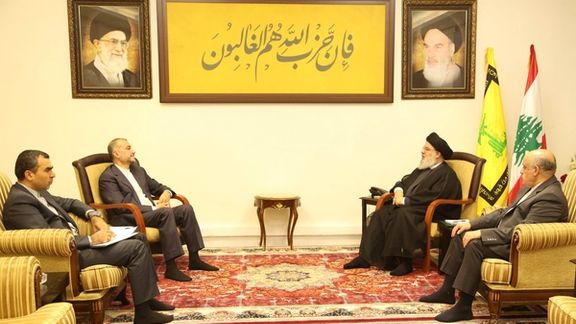
Iran's foreign minister on Friday warned of escalating violence in the Middle East if Israel’s attacks on the Gaza Strip don’t halt immediately.

Iran's foreign minister on Friday warned of escalating violence in the Middle East if Israel’s attacks on the Gaza Strip don’t halt immediately.
Hossein Amir-Abdollahian and the head of militant Lebanese group Hezbollah, Hassan Nasrallah, met in Beirut to discuss the war that started last week after Hamas attacked Israel killing more than a thousand civilians and taking more than a hundred people hostage.
The foreign minister is on a tour of the region to meet with powerful militant groups in Iraq, Lebanon and Syria to mobilize support against long-time foe Israel.
Speaking to journalists after meeting with his Lebanese counterparts, Amir-Abdollahian said actions taken by Hamas over the weekend were in response to policies of Benjamin Netanyahu, the Israeli Prime Minister, an avid critic of the ruling clerical regime in Iran.
“If these organized war crimes that are committed by the Zionist entity don’t stop immediately, then we can imagine any possibility,” said Amir-Abdollahian.
The statement comes after both Iran’s ruler, Ali Khamenei, and President Ebrahim Raisi extended congratulatory remarks praising Hamas for its “courage and bravery” after their air land and sea attack on Israel.
Iran is a supporter of Hezbollah in Lebanon and Hamas in Gaza, though it has denied involvement in the recent attacks on Israel. The Washington Post and the Wall Street Journal have quoted sources who have said that Iran is complicit in the Hamas attacks.
The visit comes amid growing international concerns that the war could spread to Lebanon’s border and the wider Middle East given high animosity and tensions in the region.
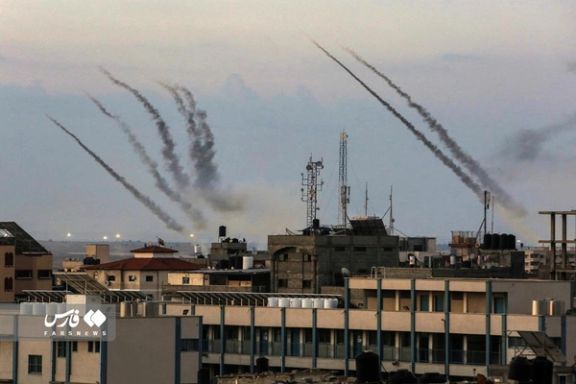
While Iran’s foreign minister speaks of new battle fronts against Israel, several lawmakers in Tehran boasted of assisting Hamas, echoing the regime's rhetoric.
Foreign Minister Hossein Amir-Abdollahian said on Thursday that the continuation of Hamas-Israel war will prompt a response from "the rest of the axis of resistance." The ‘resistance' front or axis is the term coined by the Islamic Republic to describe its logistic, financial and intelligence support for the Syrian regime, the Lebanese militant group Hezbollah, and dozens of militia groups in the region, several of which were created by Iran.
"This is just the beginning,” Iranian lawmaker Kamal Alipour told Didban Iran website, adding that “if the Supreme Leader orders, we will also have military support for Hamas." Referring to the Iraq-Iran war in the 1980s, he said that “Iran stood against Iraqi leader Saddam Hussein for eight years, therefore war against Israel is nothing in comparison to that.”
Alipour added, "Iran has provided consultation and military training to Hamas forces. Basically, the philosophical underpinning of our Islamic Revolution is to assist the oppressed and downtrodden people of Palestine."
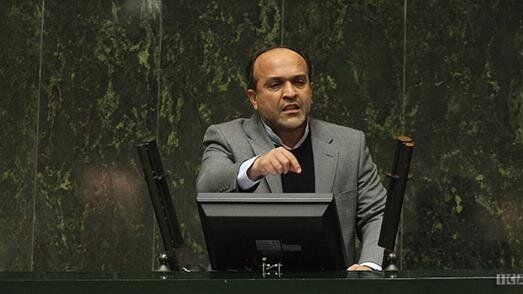
His remarks were echoed by another lawmaker, Shahriar Heydari, who emphasized that Iran has backed Hamas through military training and advisory support, claiming that due to the blockade of Gaza, “sending weapons from Iran is not possible but if such an opportunity were available, we would provide our utmost support... In terms of military training, we have been and will remain a source of assistance."
"We have trained the resistance forces and Hamas to use missile technology, but these technologies belong to the Palestinians and the fighters themselves," he claimed.
While the Islamic Republic is cheering about the war in Israel, Iranians’ reactions to the regime’s propaganda indicate a complex societal schism. Countless posts sympathetic to Israelis who have suffered the biggest loss of life in one day since the holocaust are promoting hashtags such as “Iranians Stand With Israel.”
Numerous social media posts are encouraging people loyal to the regime to travel to Israel and support Hamas in the battlefield, suggesting that this might be the most direct path to becoming revered "martyrs" in their revolutionary ideology.
Regime-sponsored rallies were also held on Friday across Iran in solidarity with the Hamas attack, praising the “miraculous and wonderful operation” that made “terror and fear engulf” Israel.
The Iranian foreign minister, in Beirut on a tour of Iraq, Lebanon and Syria, was received at the airport by top officials of Hamas, Islamic Jihad and Hezbollah. "Some Western officials have questioned if there is an intention to open a new front against the Zionist entity. Of course, in light of the continuation of these circumstances that are war crimes,” he said, referring to the displacement of Palestinians and cutting water and electricity to the Gaza Strip.
Western governments and media are questioning Iran’s role in the Hamas attack and its long-standing financial and military support for militant groups in the region. The Iranian foreign minister’s remarks push Tehran further to the forefront of the conflict.
Israel has been pounding Gaza in retaliation for the Hamas rampage in Israel this week that has killed well over 1,000 civilians, the deadliest attack on civilians in Israeli history. More than 1,500 Palestinians have been killed.
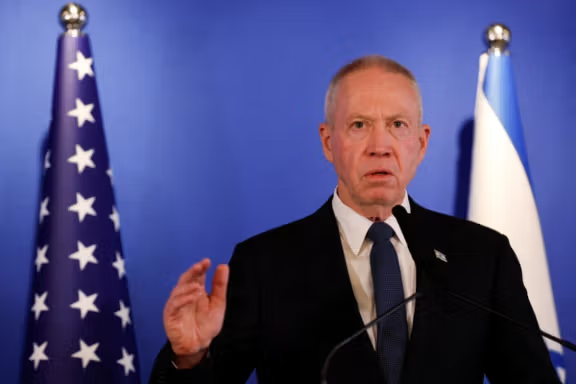
Hamas, Hezbollah and Iran form an “axis of evil”, Israeli Defense Minister Yoav Gallant said on Friday, as the army continued to pound Gaza.
Israel is waging all-out war on Hamas militants to effect permanent change and safeguard its future as a prosperous democracy, Gallant said on Friday, describing Hamas as part of an "axis of evil" with Iran.
The Iranian clerical regime has cheered and celebrated the Hamas terror attack that killed well over 1,000 Israeli civilians on October 7. According to estimates, Tehran has been providing at least $100 million annually to the Palestinian group.
Asked during a news conference with his US counterpart Lloyd Austin whether Tehran consented to the weekend Hamas onslaught from the Gaza Strip, Gallant said: "It doesn't matter ... (because) the idea is an Iranian idea."
As fighting raged into its seventh day, Gallant said Palestinian civilians "who want to save their lives" must heed Israel's warning to evacuate southward in the enclave - amid UN warnings that the humanitarian crisis there could spiral.
He declined, however, to answer a reporter's question on whether Israel - which has signaled that a ground invasion could follow its current air barrage on Gaza - would stick to the 24-hour evacuation notice it issued on Friday morning.
"This is a war for the existence of Israel as a prosperous state, as a democratic state, as homeland of the Jewish people," Gallant said.
"We are fighting for our home. We are fighting for our future," he said. "The path will be long, but ultimately I promise you we will win."

The European Parliament Thursday announced the finalists for this year’s prestigious Sakharov Prize that includes Mahsa Amini and the Woman Life Freedom Movement in Iran.
Last year, the death of Mahsa Amini, the 22-year-old Kurdish-Iranian woman while in police custody for improper attire, sparked one of the most widespread anti-government protests across the country. The crackdown on protests resulted in hundreds of deaths and thousands of arrests by authorities, according to human rights organizations.
The Woman Life Freedom Movement has gained international attention in support of Iranian women who have been enduring decades of oppression and enforced hijab by the Islamic Republic’s regime since 1979.
The Sakharov Prize is awarded each year by the European Parliament since 1988 to honor individuals and organizations that defend human rights and basic freedoms. The winning laureates for 2023 selected by the European Parliament will receive the prize in a ceremony in December in Strasbourg.
Previous recipients of the prize include Nelson Mandela and Malala Yousafzai, who also won the Nobel Peace Prize.
The shortlist is the latest show of recognition of the plight of Iranian women by the international community. Last week, jailed activist Narges Mohammadi was awarded the 2023 Nobel Peace Prize for what the committee called “her fight against the oppression of women in Iran and her fight to promote human rights and freedom for all.”
Meanwhile, days after the one-year anniversary of Mahsa Amini’s death in September, Iranian parliament passed a chastity and hijab bill to impose heavier penalties on women who do not follow the compulsory Islamic dress code.
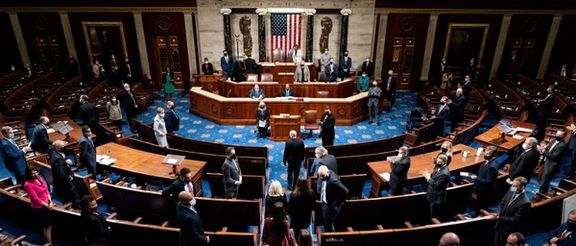
More than 100 House Republicans have backed a bill to refreeze the $6 billion in Iranian oil revenue that was released last month as part of a prisoner swap deal.
The deal had many opponents among the Republicans from the onset. Some called it ‘ransom’ and warned that the regime in Iran may use it against US interests. But the Biden administration maintained that the funds were watched closely and could only be used for humanitarian purposes.
Once Hamas, a group supported by Iran, launched a terror attack on Israel, the opponents of the deal felt vindicated and took direct action.
“A month ago… the Biden Administration unfroze $6 billion and made it available to Iran,” said Congressman August Pfluger who introduced a bill to block Iran’s access to the fund. “This $6 billion will be used to backfill the money that Iran is paying to Hamas if we don’t act. Since the Administration refuses to permanently freeze the funds, Congress will.”
One day earlier, Treasury Secretary Janet Yellen had hinted that the funds could be frozen once more. John Kirby, spokesperson for the US National Security Council, did also suggest that the funds “can be re-frozen” at any time.
But neither statement satisfied the Republicans, it seems. They wanted an immediate and permanent ‘refreeze’.
Section 2 of the bill reads, “notwithstanding any other provision of law, on and after the date of the enactment of this Act, the President may not exercise the waiver authority…”
It’s not clear when this bill would be put to a vote. Republican Study Committee Chairman Kevin Hern who co-leads the bill with Rep. Pfluger said in a statement he will “work to get a vote on the House floor as soon as possible.”
The bill and the demands made by Republican senators highlight the deep divisions in Washington on Iran policy in general and the fate of the $6 billion, in particular.
With the 2024 election campaign well under way, President Biden may find it hard to devise a new policy, let alone implement it. He has been chasing some form of agreement with the Islamic Republic in the hope that it would curb the regime’s nuclear ambitions. But the Republicans may very well turn any such agreement into an attack line against the backdrop of the Hamas attack in Israel.
The Pfluger/Hern bill has wide support in the House and can be expected to pass. It will add to the pressure on Biden and his administration to refreeze the $6 billion fund even before the bill is enacted into law. The issue is that no one knows exactly what kind of a deal the administration has with Qatar over the money.
The Washington Post reported Thursday that a senior official from the US Treasury has informed House Democrats that the US and Qatar have agreed to deny Iran the use of the $6 billion fund even for non-sanctionable goods.
The unfrozen $6 billion was transferred from two South Korean banks to a Qatari bank with the State Department’s greenlight.
Asked about the Washington Post report, Secretary of State Antony Blinken, avoided a direct response. “We have strict oversight on the funds, and we retain the right to freeze them,” he said.
Iranian officials are yet to react to the movements in Washington aimed at refreezing the unfrozen fund.
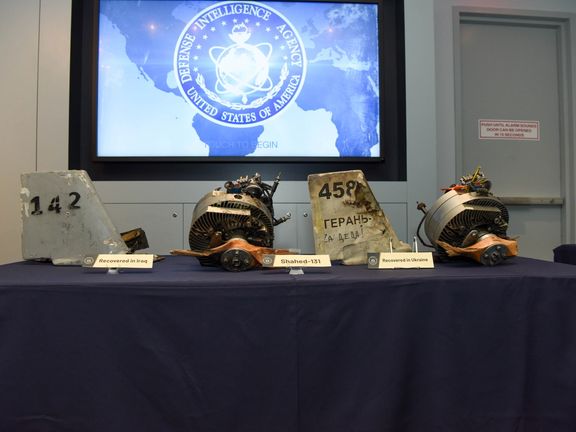
Officials from the US military showed what they said were pieces of Iranians drones found in Ukraine to United Nations member states on Thursday.
The event was held by the United States Defence Intelligence Agency (DIA) and attended by representatives from more than 40 countries, said the US mission to the UN.
On display were debris including parts of Iranian drones Shahed 101, 131, and 136 that were used by Russia to attack Ukraine since October 2022. The exhibition provides evidence of strengthening ties between the Islamic Republic and Moscow, according to the Pentagon.
“These are not replicas. These are the real thing,” said Linda Thomas-Greenfield, US Representative to the UN in her remarks.
“These are the weapons of war that Iran has transferred to malign actors in violation of Resolution 2231 that are being used to decimate civilians and critical infrastructure,” Thomas-Greenfield added.
US defence officials previously displayed pieces of Iranian drones recovered in Ukraine in Washington in August.
Despite evidence, Tehran has been denying its supply of drones to Russia on numerous occasions. The US and the European Union have slapped Iran with sanctions concerning its supply of drones to Russia.
Britain also took part in the event at the US mission to the UN, with officials also showing evidence of what they said were missiles and components with Iranian markings and serial numbers.
“Iran’s transfer of these drones is a grave threat to international peace and security,” said Thomas-Greenfield at the event.
“And it’s going to take all of us, working together, to ensure the international community does the right thing and continues to hold Iran to account,” she added.